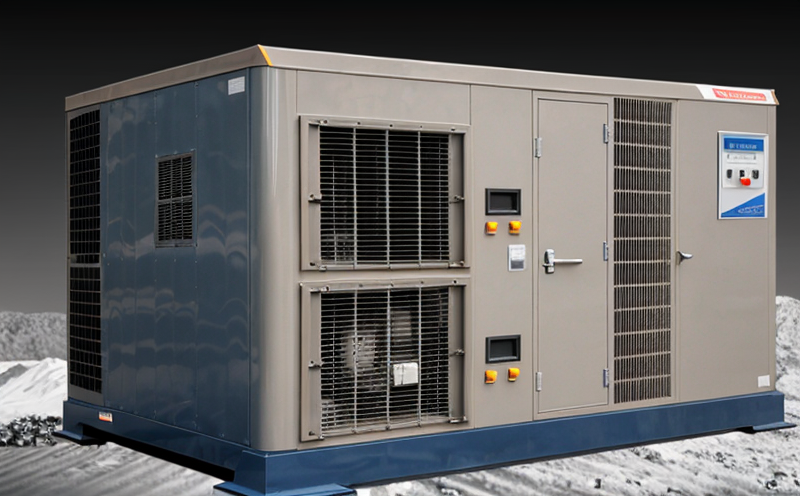ASTM E2160 Thermal Performance of Insulation Materials Testing
The ASTM E2160 standard provides a comprehensive method for evaluating the thermal performance of insulation materials. This testing is crucial in ensuring that materials meet stringent performance criteria, particularly in sectors where energy efficiency and durability are paramount, such as HVAC, construction, and aerospace.
Thermal performance tests measure how well an insulation material resists heat transfer under defined conditions. The ASTM E2160 procedure involves subjecting a specimen to controlled heating and cooling cycles over time. This helps determine the thermal resistance of the material, often quantified as R-value or U-factor. Accurate testing is vital for quality managers, compliance officers, R&D engineers, and procurement teams to ensure that materials meet industry standards.
The ASTM E2160 test setup typically includes a climate chamber capable of maintaining precise temperature and humidity levels. The specimen is placed in the chamber and subjected to thermal cycling according to the specified protocol. This process allows for the measurement of heat flow through the insulation, providing insights into its thermal efficiency. By adhering to this standard, laboratories can deliver reliable data that supports informed decision-making throughout product development cycles.
One key aspect of ASTM E2160 testing is specimen preparation. Proper sample conditioning ensures consistent results across multiple tests. This involves handling and storing samples under specified conditions before placing them into the climate chamber for testing. Specimens must be representative of actual field use to ensure accurate performance evaluation. Laboratories with expertise in this area can provide guidance on appropriate sample preparation techniques.
The ASTM E2160 procedure also covers considerations related to test duration, frequency, and reproducibility. These factors play a significant role in determining the reliability of thermal resistance measurements. Longer durations may yield more accurate results but require additional resources and time. Reproducibility is essential for maintaining consistent outcomes across different testing sessions or locations.
Understanding ASTM E2160 involves recognizing its importance within broader insulation material quality assurance frameworks. By incorporating this standardized test into your testing protocol, organizations can enhance their commitment to sustainable practices while ensuring compliance with relevant regulations and industry expectations.
Frequently Asked Questions
Quality and Reliability Assurance
Evaluating the quality and reliability of insulation materials through ASTM E2160 testing ensures consistent performance across various applications. For instance, in HVAC systems, reliable insulation is essential for efficient energy management and reduced operational costs. By adhering to this standard, laboratories play a pivotal role in enhancing product integrity and customer satisfaction.
Quality assurance teams benefit greatly from ASTM E2160 as it provides clear guidelines on specimen preparation, test conditions, and data interpretation. This ensures that all testing is conducted consistently according to industry best practices. Furthermore, the detailed reports generated from this process offer valuable insights into material behavior under specific thermal stress conditions.
In summary, integrating ASTM E2160 into your quality control workflow helps maintain high standards of insulation performance. It supports continuous improvement initiatives by providing actionable data that can be used to optimize manufacturing processes and enhance product offerings.
International Acceptance and Recognition
- Australia: The Australian Standard AS/NZS 3740 aligns closely with ASTM E2160, ensuring mutual recognition between the two standards.
- Canada: The Canadian Standards Association (CSA) recognizes ASTM E2160 as a valid method for assessing insulation materials' thermal performance.
- European Union: EN ISO 9347, which corresponds to ASTM E2160, is widely accepted across EU member states.
- India: IS: 15338 specifies procedures similar to those outlined in ASTM E2160 for testing insulation materials.
- Japan: JIS Z 7402, another standard closely aligned with ASTM E2160, ensures compatibility and acceptance within Japan's regulatory framework.
- Korea: KS F 3890 follows the ASTM E2160 protocol, fostering international collaboration in insulation material testing.
The widespread adoption of ASTM E2160 across multiple regions underscores its significance as a global benchmark for thermal performance evaluation. Laboratories that adhere to this standard gain an advantage by ensuring their services are recognized internationally.
Use Cases and Application Examples
| Application | Description |
|---|---|
| HVAC Systems | Evaluating insulation used in heating, ventilation, and air conditioning units to ensure optimal energy efficiency. |
| Building Envelopes | Determining the thermal performance of walls, roofs, and floors to enhance building insulation. |
| Aerospace Components | Assessing insulation in aircraft structures for improved temperature regulation during flight. |
| Retail Refrigeration | Maintaining consistent temperatures within refrigerated displays to preserve product integrity. |
These applications underscore the versatility and importance of ASTM E2160 in diverse fields. By adopting this standard, laboratories contribute significantly to advancing insulation technology and promoting sustainable practices.





